From Seminarian to Minister
| Site: | Equip PC(USA) Training |
| Course: | A Brief Guide to Entering PC(USA) Ministry |
| Book: | From Seminarian to Minister |
| Printed by: | Guest user |
| Date: | Sunday, December 21, 2025, 10:29 PM |
Description
Information relating to the authorizations necessary to begin searching for a first call, a look at recent trends in finding calls, and some guidance on compensation items that are negotiated in PC(USA) pastoral calls.
Authorization
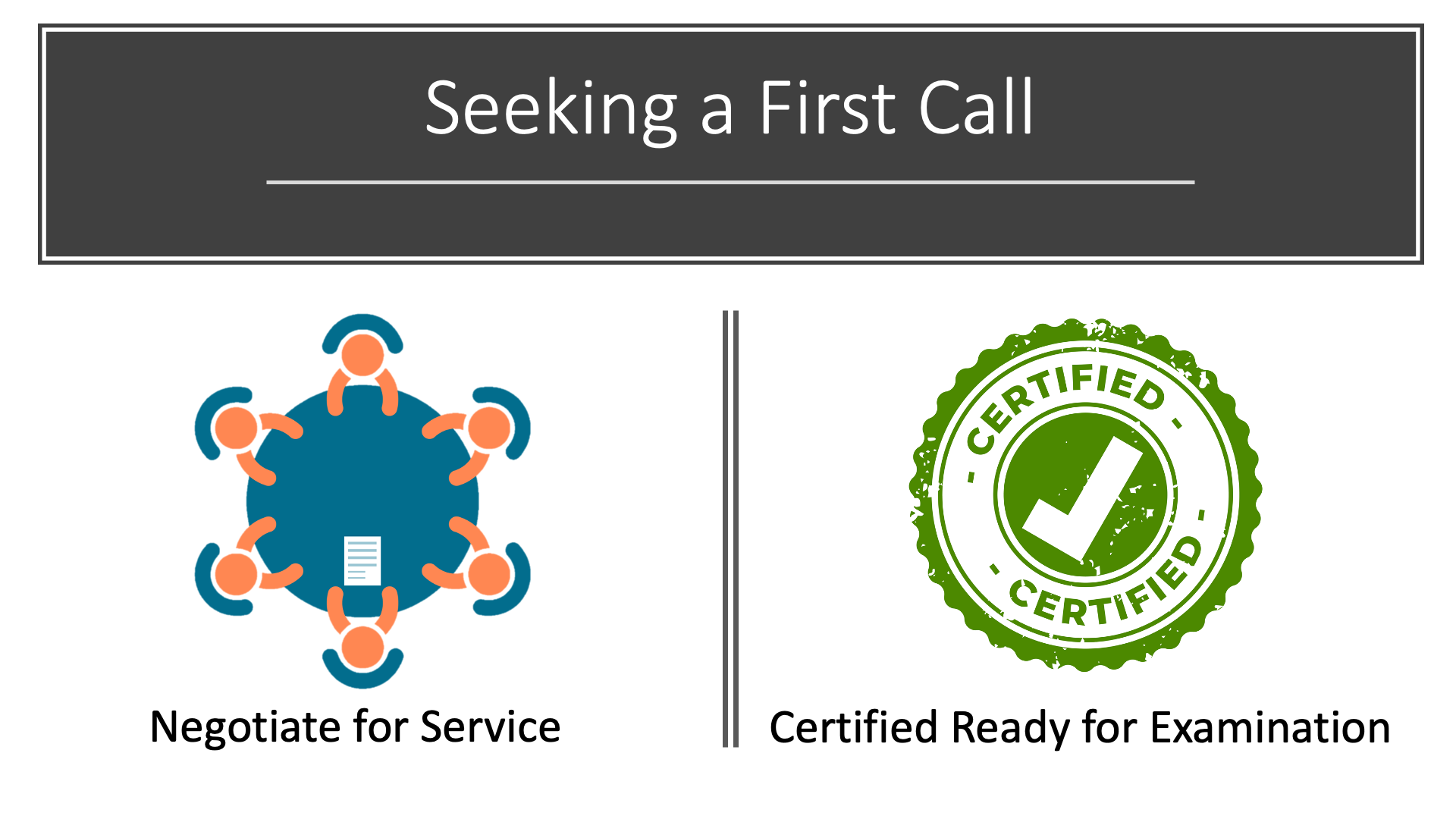 The Book of Order is clear that candidates “may not enter into negotiation for ... service as a minister of the Word and Sacrament without approval of the presbytery of care” (G-2.0607). Such approval can come in one of two forms, either permission to "negotiate for service" or "certification of readiness to be examined for ordination, pending a call." While the text of G-2.0607 utilizes both expressions, the Book of Order does not explicitly delineate the differences between them. For that distinction, which has very important implications, one has to look to binding guidance that has been given and reaffirmed by the General Assembly.
The Book of Order is clear that candidates “may not enter into negotiation for ... service as a minister of the Word and Sacrament without approval of the presbytery of care” (G-2.0607). Such approval can come in one of two forms, either permission to "negotiate for service" or "certification of readiness to be examined for ordination, pending a call." While the text of G-2.0607 utilizes both expressions, the Book of Order does not explicitly delineate the differences between them. For that distinction, which has very important implications, one has to look to binding guidance that has been given and reaffirmed by the General Assembly.
An “authoritative interpretation” issued by the 219th General Assembly (2010), and reaffirmed by action of the 220th General Assembly (2012), clarified that under specific conditions a presbytery could approve a candidate to “negotiate for service” even before it had “certified [that] candidate ready for examination for ordination, pending a call.” The full text of that authoritative interpretation, edited to reference the current paragraphs in the Book of Order and changes to the Church Leadership Connection system, is as follows:
Section [G-2.0607] allows a candidate to enter into negotiation for his or her ministerial service, even if the candidate has not had his or her final assessment from the presbytery’s committee on preparation for ministry, provided the candidate
- has completed two full years of theological education (or the equivalent thereof),
- has had an annual consultation within the last year,
- has satisfactorily completed all the standard ordination exams or received certification of readiness under [G-2.0610],
- has received the approval of the candidate’s committee on preparation for ministry.
If the committee on preparation for ministry has approved a particular candidate who meets all the aforementioned requirements to enter into negotiation for his or her ministerial service, that candidate may circulate a [Personal Discernment Profile] or other biographical information. (Minutes, 2010, Part 1, page 60)
Because the Assembly in 2012 reaffirmed the full text of its authoritative interpretation in applying it to the current language of G-2.0607, each of the provisions set forth in the bulleted list remains binding upon presbyteries in making decisions as to whether or not to approve a particular candidate to enter into “negotiation for his or her service as a minister of the Word and Sacrament” prior to “certification [of that candidate’s] readiness for examination for ordination, pending a call.”
Negotiate for Service
Candidates must understand that permission to "negotiate for service" is not automatic if the conditions in the authoritative interpretation have been met. In fact, such approvals are not the usual practice of presbyteries, and they are typically reserved for those who are clearly nearing the time for their “final assessment” and are fully expected to be “certified ready for examination” when the assessment is conducted. Neither candidates nor the congregations or agencies that may wish to call them will be well served by extended delays caused by failure to meet the requirements of “final assessment.”
This principle is clearly illustrated by the condition that the candidate must have "satisfactorily completed all the standard ordination exams." It is not sufficient that any remaining exams have been scheduled in the near future, since the exam results may turn out to be "Unsatisfactory" or unforeseeable circumstances may prevent the candidate from being able to take the exams as scheduled. Either situation would delay the candidate's availability to be considered for a call by four to six months, or more.
If a candidate is seeking a call based only on an approval to "negotiate for service," then they should clearly communicate to any congregations or organizations with whom they are negotiating exactly what provisions remain before their presbytery of care will "certify [them] ready for examination, pending call" and the projected timeline for fulfilling those provisions. In no case can a presbytery of call proceed to validate a ministry offer or examine a candidate for ordination before the presbytery of care has certified the candidate.
Certification of Readiness
“Final assessment” is a formal review by the presbytery’s committee to make a determination as to whether a candidate is “ready for examination for ordination, pending a call.” It is usually scheduled when a candidate has satisfied all the requirements of G-2.06, including both the time requirements of G-2.0602 and the educational and assessment requirements of G-2.0607b-d. Since those are usually easily verifiable, a major focus of the "final assessment" will be a consideration of "evidence" that the candidate possesses the qualities identified in G-2.0607a: “wisdom and maturity of faith, leadership skills, compassionate spirit, honest repute, and sound judgment.” In a very real sense, everything that has transpired in the relationship between the candidate, the session, and the presbytery during the preparation process is evidence for, or against, the person possessing these essential qualities of ministers of the Word and Sacrament. “Final assessment,” then, is where the presbytery makes its determination of the candidate’s “fitness and readiness” based on prayerful reflection, review of the covenanted goals negotiated with the candidate, and on their mutual discernment that God has called that person and that they have adequately prepared by developing personal gifts for ministry in response to that call.
A determination that a candidate is "certified ready" means that there are no requirements remaining to be fulfilled. Candidates, however, should not think of “certification of readiness” like a diploma received at the end of an academic course of study that conveys “all the rights and privileges pertaining thereto” (as many diplomas state) from then on, forever. Just as a presbytery has the ability to remove a person from its roll of inquirers and candidates “for sufficient reasons” (G-2.0609), it can also remove a candidate’s “certification of readiness” if it has reasons to believe that the person is in fact no longer ready to assume the responsibilities of ministry of the Word and Sacrament.
It is important, then, that candidates continue to remain in contact with their covenant partners in the preparation process--both presbytery and session--as they are seeking a call, and that they continue to be engaged in "supervised service to the church" (G-2.0606) to maintain and continue to develop their gifts for ministry as they seek their first call. Not only will the presbytery of care be looking for such practice, but so will any potential calling agencies or congregations.
Trends
Students looking toward graduation, no matter the field of study, are also looking beyond to get a sense of what professional and vocational opportunities will be open to them once they finish their formal education. In this section, we will present some statistics regarding current trends relating to the transition from "candidate" to "ordination to a first call."
Before getting into the details, however, we need to say something about the data on which this discussion of trends is based. All the statistics here are based on the reporting of each presbytery regarding their respective inquirers and candidates. With 169 presbyteries differing in how they handle their reporting, there are bound to be some inconsistencies in the timeliness and completeness of the reported data. As just one example, consider this table regarding the differences between the reporting of presbyteries of care regarding their candidates who have been ordained and the annual statistical reporting by presbyteries regarding their minister members.
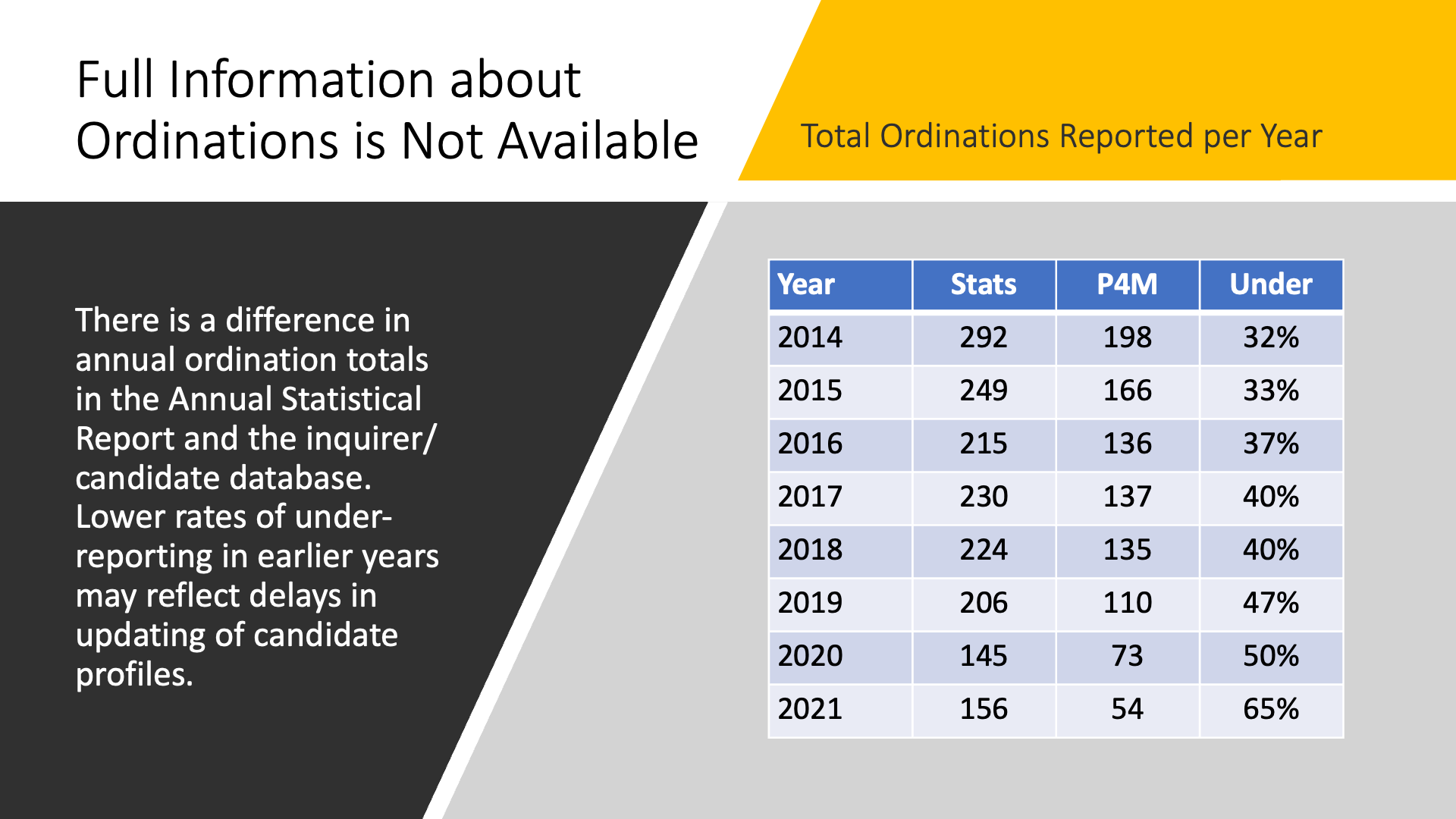
Though the trends in this table suggest that presbytery reporting does catch up over time, the information available at any particular point in time is not comprehensive. Nevertheless, the variations in reporting are random enough in terms of presbytery size, region, etc., that the trends are likely to be generally accurate even if the specific numbers are incomplete.
Origins and Destinations
One trend that is important to note is that most candidates moving into first calls are very likely to serve in congregations that are different in size than the congregations of which they were members during their time under care. To appreciate the impact of this development, we can consider one approach to comparing congregational sizes that takes into consideration the differing role of pastors and how the size of the congregation affects the nature of the pastoral relationship.
Briefly stated, this research divides congregations into four groups.
- “Family-Size” churches have up to 75 members and typically average less than 50 in weekly attendance. The pastor’s role in such congregations is often likened to that of a chaplain, because the direction and leadership of the congregation is largely controlled by one or two prominent families.
- “Pastor-Size” churches can have from 75 to 250 members and average up to 150-175 in worship. In these congregations, the pastor’s role is shaped by personal relationship with the members, and the upper limit is set by the number of people with whom it is possible for one individual to truly engage in personal relationship.
- “Program-Size” churches with 250 to 750 members and average attendance of around 500 would be the next grouping. Congregations in this range generally begin to have one or two other staff persons, though they may serve in non-ordained positions. The pastor’s role and duties define most members’ relationship with the pastor.
- “Corporate-Size” congregations have the broadest range in membership, from say 800-900 members to “megachurches” with several thousand members. They have large staffs of ordained and non-ordained persons, each with rather specialized areas of ministry and focus. While members will likely form relationships with staff persons with whom they have regular contact, the ultimate basis for that relationship is the particular pastor’s or associate pastor’s responsibilities within the congregation.
So, how does the congregational experience of our inquirers and candidates relate to the distribution of congregations within the Presbyterian Church (U.S.A.)? Well, as the chart below indicates, they are almost exactly opposite. While almost nine-out-of-ten (89%) of our congregations at year end-2022 were in the “Family” and “Pastor” size categories (fewer than 250 members), over half of our candidates (54%) come from “Program” and “Corporate” size churches (more than 250 members). This distribution of inquirers and candidates really should not be that surprising. The members of the PC(USA) have about the same distribution across these congregational-size categories as our inquirers and candidates.
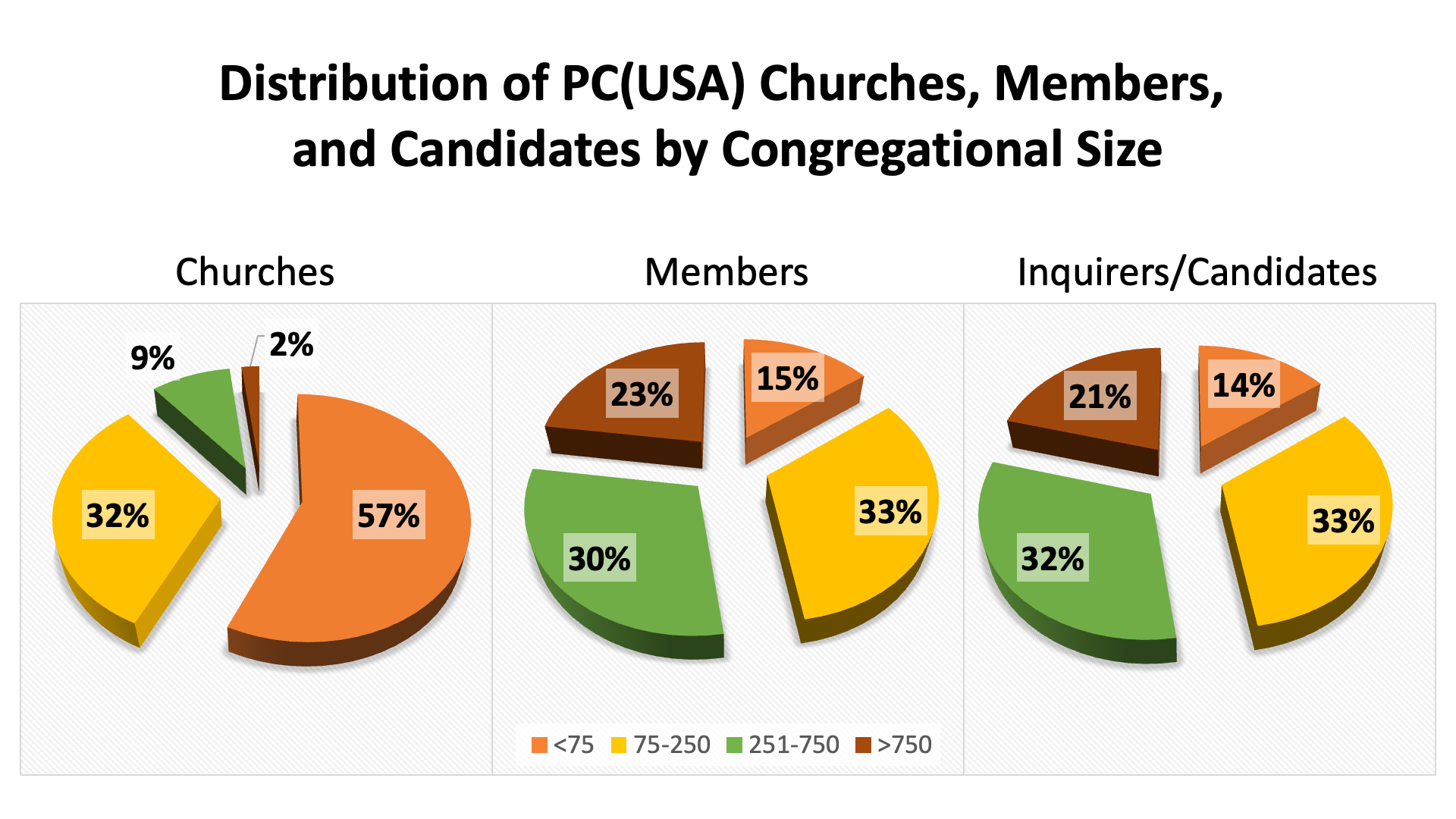
When seeking a first call, then, candidates are more likely to find a call if they are open to serving in congregations in a range of sizes and a variety of locations. Limiting oneself only to those places that "feel like home" will greatly reduce opportunities for ministry.
Time Seeking a Call
So, what are the patterns in how long it takes to receive a first call? Well, to begin with, we need to return to where we began with the fact that candidates cannot begin to seek a call until they are at least given permission to "negotiate for service," and cannot accept a call until "certified ready for examination, pending a call." Consequently, the clock may not start at seminary graduation, and it doesn't stop until the person has been ordained (we will look at data regarding candidates still searching on the next page). Additionally, we don't in all cases have the dates for both when those receiving calls were "certified ready" and when they were "ordained." But as mentioned earlier, the samples we do have are large enough and random enough to likely represent the general trend.
Interestingly, as the chart below illustrates, time spent seeking a first call has decreased over the past few years (that is, since the peak of the coronavirus pandemic in 2020-21). Whereas roughly one-third (34%) received a call within six months in the period 2014-19, that percentage has risen to 45% (just over 3-in-7) in the period 2020-2022. During the more recent period, two-thirds (67%) of candidates found calls within a year. Though we don't have firm numbers for how long already ordained ministers spend looking for second and subsequent calls, at least anecdotally the trends are comparable for how long it takes to receive first calls and new subsequent calls.
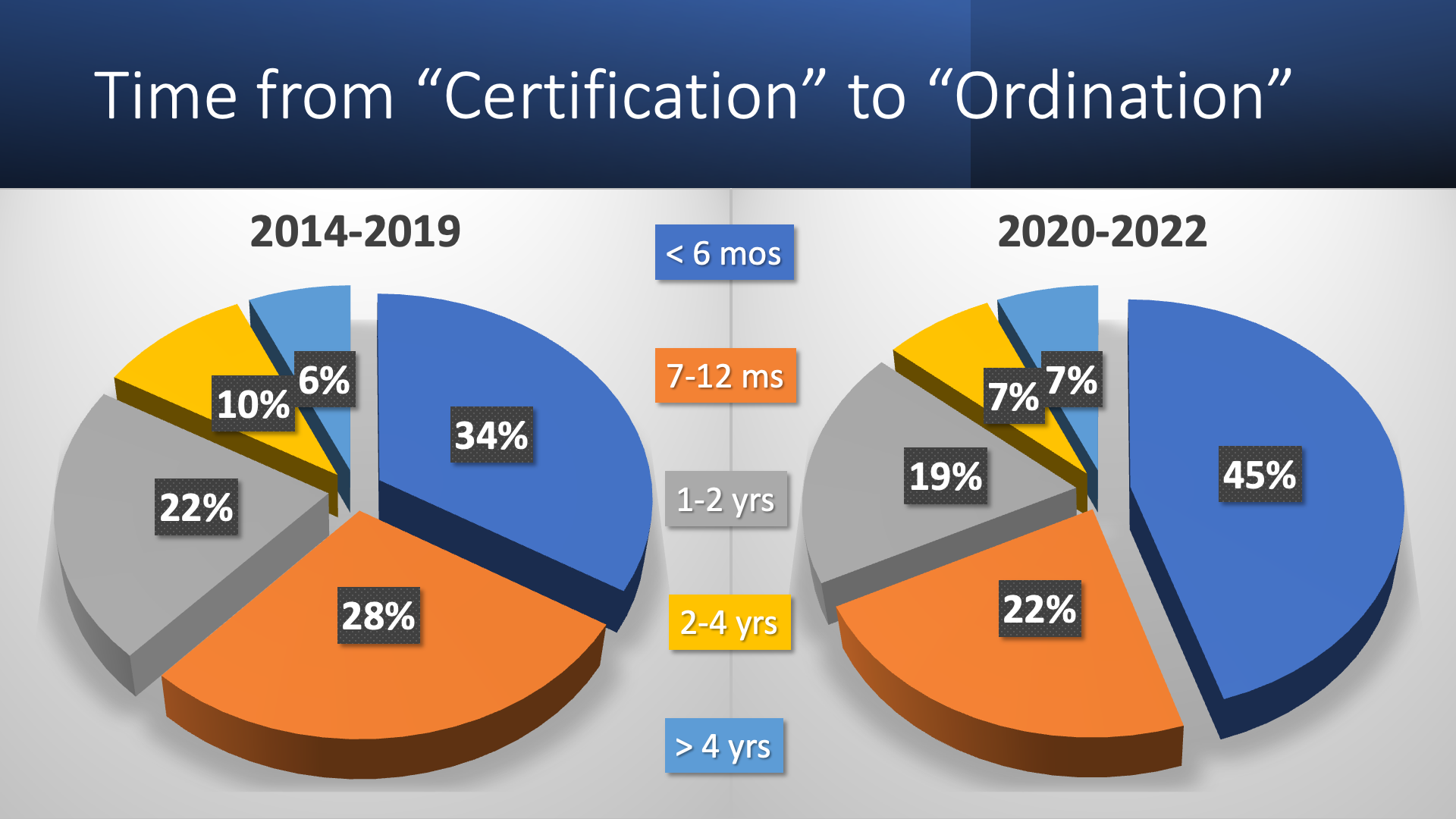
Additional statistics show that more women than men have been ordained each year since 2012 and that there are no significant differences (given the margins of error) in the distribution of women and men in the different time durations (ranging from equal to 4%).
Those Still Seeking
As mentioned previously, the total time spent seeking a call can only be determined once a person is ordained. What trends are we seeing among those who are still seeking? This chart illustrates the distribution of candidates reported as "active" in the process and cleared to seek a call at the end of the third quarter of 2022.
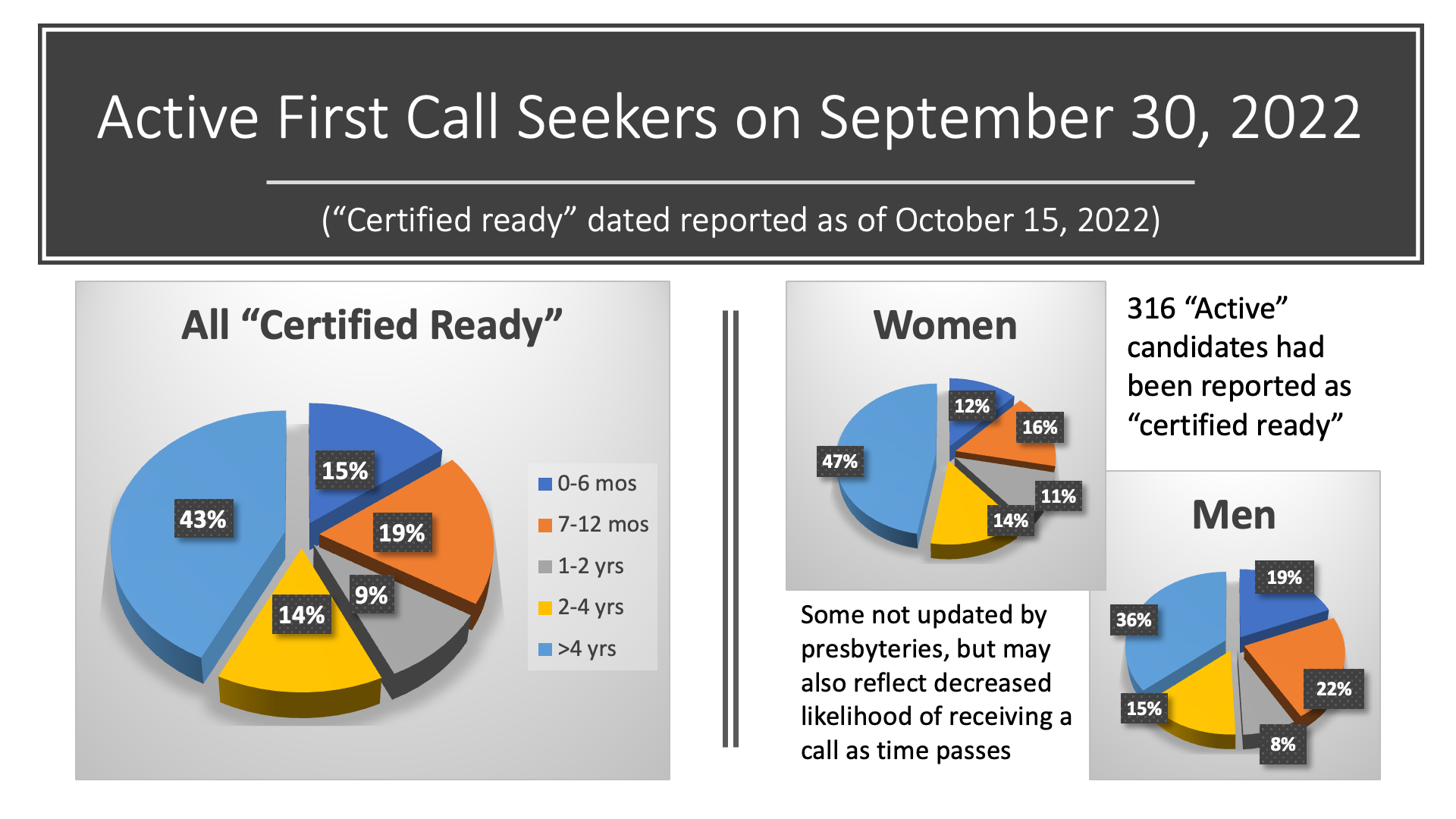
In general terms, the lower percentages in the shorter time ranges are consistent with what we have seen in the data regarding time-to-ordination; since most candidates secure a first call within a year, there are proportionately fewer candidates actively seeking a call within the lower time ranges.
What is at first glance surprising--and perhaps somewhat alarming--is the high proportion (43%, or just over 2-in-5) who are reported as having been seeking a call for more than four years. However, we also know from the under-reporting of ordinations data (see again the chart at "Trends"), that number is inflated by persons who have been ordained but whose candidacy profiles have not been closed. It likely also includes some who have stopped actively seeking a call, having taken positions that did not require ordination to the ministry of the Word and Sacrament, but also have not been reported as having withdrawn from the process (for example, while in mid-October 2022 there were more than 316 "active seekers" in the inquirer/candidate database, the Church Leadership Connection applicant report showed only 84 personal information forms for persons seeking a first call).
Nevertheless, both this data and the data on time-to-ordination do suggest that if a person has been seeking a first call for more than four years, the likelihood of receiving a call that would require ordination as a minister of the Word and Sacrament decreases significantly. It does happen, but the numbers are small.
Negotiating a Call
Once approved to begin seeking a call, whether by permission to "negotiate for service" or "certification of readiness," a candidate can begin applying for ministry opportunities. But let's face it, there was never a time when churches placed "help wanted" ads in the local newspaper, and they are unlikely now to post openings on employment websites like ZipRecruiter, Indeed, and Monster. How does one learn about ministry opportunities, and what do you need to know about negotiating such positions?
Opportunities Search
 As it happens, the Presbyterian Church (U.S.A.) does have its own version of ZipRecruiter. It is called "Church Leadership Connection," or "CLC" (https://clc.pcusa.org). Once your presbytery approves you to begin seeking a call, you will be able to post a "Personal Discernment Profile" (PDP) on the site that can then be matched with "Ministry Discernment Profiles" (MDPs) posted by congregations and agencies seeking ministerial leadership. You will also be able to use the "Opportunity Search" page (also accessible from the "Discerning your Call" search tool on the CLC homepage) to find openings for which you may be able to "self-refer" (be aware, however, that not all positions will accept self-referrals). If you have a CLC account and are logged in to the system, you can go to the site's "Applicants and Positions Report" page to see real-time information about the number of calls and call-seekers active in the system--even before you are approved to circulate a PDP on CLC.
As it happens, the Presbyterian Church (U.S.A.) does have its own version of ZipRecruiter. It is called "Church Leadership Connection," or "CLC" (https://clc.pcusa.org). Once your presbytery approves you to begin seeking a call, you will be able to post a "Personal Discernment Profile" (PDP) on the site that can then be matched with "Ministry Discernment Profiles" (MDPs) posted by congregations and agencies seeking ministerial leadership. You will also be able to use the "Opportunity Search" page (also accessible from the "Discerning your Call" search tool on the CLC homepage) to find openings for which you may be able to "self-refer" (be aware, however, that not all positions will accept self-referrals). If you have a CLC account and are logged in to the system, you can go to the site's "Applicants and Positions Report" page to see real-time information about the number of calls and call-seekers active in the system--even before you are approved to circulate a PDP on CLC.
It is important to know, however, that not all ministry openings in the PC(USA) are required to be listed in CLC. There are a variety of reasons why this might be the case. So, how can you learn about these openings? In the same ways you would in other vocations. You will need to utilize your networks. Check with your seminary's placement office to see what congregations and agencies may have listed openings with them. Ask your presbytery's leadership about opportunities within the presbytery, or that they may be aware of in other presbyteries.
Most importantly, be open to where the Spirit may be leading you. As we noted earlier, your first call may not have much in common with the congregation in which you first sensed a call to ministry but it could be exactly the place that is needing your gifts to enable them to flourish in the next phase of their communal life and service.
Terms of Call
Within the PC(USA) setting, compensation for ministers (especially those serving as pastors) is referred to as "terms of call." Because ministerial income is treated in some very specific ways for both purposes of US tax law and possible benefits from the PC(USA)'s Board of Pensions, there are some particular things you will need to know when negotiating a call with a congregation or another agency.
 What type of position is this? “Installed” or “Temporary” (G-2.0504a & b)
What type of position is this? “Installed” or “Temporary” (G-2.0504a & b)
“Installed” calls can be for an “indefinite period” or for a “designated term” with a predetermined end date. A “temporary pastoral relationship is for … a specified period not to exceed twelve months,” although it may be renewed with the presbytery’s approval. Presbyteries have different terms for identifying “temporary” relationships, so be clear as to whether the position is “installed” or “temporary.”
 What will be your compensation (salary and benefits)?
What will be your compensation (salary and benefits)?
Effective Salary = Cash Salary + Housing Allowance
When negotiating a call your cash salary and housing allowance are negotiable. If the church provides a manse in lieu of a housing allowance, the value of the manse is usually set at the equivalent of at least 30% of the cash compensation for effective salary and tax purposes. Housing allowances cannot exceed the "fair market value" for the location, and any unused portion of the allowance becomes taxable income.
Other items to negotiate: SECA [Self-Employment Contribution Act] salary adjustment, utilities, and professional expenses (mileage, continuing education and book allowances, etc.). Most presbyteries have a policy about such items, so check with your calling presbytery for more information. Also, know what the “presbytery minimum salary” is (even if you know the offered salary is higher or the church has been granted a waiver to offer a lower salary); it may give you an idea about regional costs of living (which vary greatly across the country).
To Do: Obtain an annual declaration of your housing allowance for tax purposes, and be sure it is recorded in the Session’s minutes. Keep in mind these declarations must be "proactive," that is, formally approved before the compensation is paid. You cannot create or change a housing allowance "after the fact."

Leave is provided for Rest, Sabbath, and Continuing Education
All Terms of Call include leave in the following categories as a benefit to church workers:
- Annual Leave (Vacation and set holidays—sometimes “offset” [Easter Monday, Dec. 26])
- Study Leave (continuing education and possibly Sabbatical after specified years of service)
Other items to negotiate: Sick Leave and Family Leave [FMLA] (may be paid or unpaid according to presbytery policy). Will such leave be awarded on an “accrual basis,” or will it be granted “as needed” with negotiation for “leave of absence” if an extended need arises?

Insurance Augments: Dental, Supplemental Life, Co-Coverages
Questions to ask: Who will pay for any elected optional coverages through the Board of Pensions? What opportunities are available to establish a “Flexible Spending Account” for either medical or dependent care expenses?
 Moving Costs are a Negotiated Item
Moving Costs are a Negotiated Item
This is an essential item to discuss with PNCs. Some congregations cover the full cost of a move. Most congregations cover the cost up to a maximum amount. Know both the amounts agreed to and the process the congregation expects to be followed (multiple bids submitted, reimbursement or direct bill, etc.). Also, keep in mind that any moving expenses paid by your employer are taxable income, so you will need to reserve funds to cover this extra tax liability.
 Managing Educational Debt
Managing Educational Debt
Investigate “Income-Based Repayment” (IBR) and other student loan repayment options (http://www.consumerfinance.gov/students/repay/). IBR offers up to three years of interest subsidies to ease the transition into repayment.
Congregations with 150 members or less meet one of several requirements for debt assistance offered by the Board of Pensions and the General Assembly Mission Council, if:
- If the position is full-time and not temporary or designated, go to the Board of Pensions Minister Educational Debt Assistance Program web page to learn more at https://www.pensions.org/your-path-to-wholeness/assistance-program/receiving-assistance/minister-educational-debt-assistance-grants
- If the position is part-time and/or temporary (including designated) there may be other loan forgiveness options. To learn more, go to https://www.presbyterianmission.org/ministries/theology-formation-and-evangelism/financialaid/loans/loan-forgiveness-for-pastors/
RESOURCES
The Office of the General Assembly Mid Council Ministries, The Presbyterian Church (U.S.A.): http://oga.pcusa.org/section/mid-council-ministries/mid-council-ministries/
PC (USA) Call System/Church Leadership Connection: http://www.pcusa.org/clc
http://www.pcusa.org/financialaid
The Board of Pensions: http://www.pensions.org
Understanding Effective Salary: https://www.pensions.org/file/what-we-offer/benefits-guidance/forms-documents/Documents/pln-103.pdf/
Session Personnel Policy Guidelines:
https://www.pcusa.org/site_media/media/uploads/oga/pdf/employment_guidance_for_sessions_and_session_personnel_committees_2021.pdf